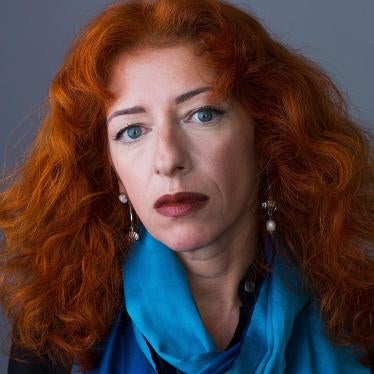Memorial’s dedicated work, including in war zones, has been honored with prestigious international awards, such as the European Parliament’s Andrei Sakharov Prize. But in a recent report summarizing its investigation of the organization, the Justice Ministry described Memorial’s work as aimed at “undermining the foundations of Russia’s constitutional rule” and “calling for overthrowing the country’s political regime.”
Calling Memorial a “foreign agent” organization, the Justice Ministry also said the group was paid by foreign donors to foster negative public opinion about Russia’s policies by criticizing government actions and court rulings. The report pointed to Memorial’s characterization of Russia’s action in Ukraine as “aggression,” and its criticism of a 2013 court verdict against protesters who demonstrated in Moscow on the eve of Vladimir Putin’s presidential inauguration in 2012.
On November 12, the ministry shared its concerns with the Prosecutor General’s Office, asking it to examine Memorial’s allegedly unlawful activities. This may result in the organization closing and severe criminal charges against its leadership.
In the three years since Russia adopted its “foreign agent” law, the Justice Ministry has branded over 100 independent groups—environmentalists, researchers, rights activists – with this label, to discredit and demonize them in the public eye. Some groups on the list have been slapped with hefty fines for supposedly failing to observe regulations for “foreign agents.” But this is the first time an organization faces tough criminal sanctions for clearly political allegations. Also, out of all the groups on that dark list, Memorial is by far the most prominent. By going after Memorial, the authorities are sending a strong signal to all the others: this is how far we’re ready to go if you do not yield, so beware.
Also this month, the Justice Ministry proposed new amendments to further toughen the “foreign agents” law by banning officials at all levels from maintaining ties with “foreign agent” groups and participating in their events. If adopted, this measure will further isolate many groups and make it impossible for them to carry out advocacy with government officials and agencies.
Another scourge for Russia’s civil society is the new law on “undesirable organizations” that authorizes the extrajudicial banning of foreign and international groups that allegedly undermine Russia’s security, defense, or constitutional order. Russians who maintain ties with “undesirables” or share their materials with Russian audiences face penalties ranging from fines to up to six years in prison.
The authorities have already banned as “undesirable” the National Endowment for Democracy, an American donor institution that had funded Russian rights groups for some two decades. Memorial was a grantee, and the Justice Ministry emphasized that when accusing Memorial of anti-Russian subversion. Various politicians in Russia are urging the authorities to ban many other foreign and international organizations, further deepening the climate of suspicion and fear. Several large donor institutions have already stopped their Russia funding preemptively, citing increasingly hostile political climate.
In light of international sanctions against Russia over Ukraine, the government’s anti-Western hysteria has been at the highest point since the end of the Cold War. The authorities claim they are resisting an attempt by the West to destroy Russia. But what they are in fact doing is stifling all forms of independent criticism by essentially equating it with extremism or anti-Russian sabotage. They block independent websites, ram new repressive laws through parliament, come up with new measures to stifle freedom of expression, charge peaceful protesters with mass rioting, and prosecute critics for speaking out online.
Russia’s international partners have been, on the other hand, too distracted by the crisis in Ukraine and the fight against ISIS to pay proper attention to what’s happening inside Russia. But if they don’t focus now and let the government destroy Memorial, Russia’s civil society could be effectively extinguished.








